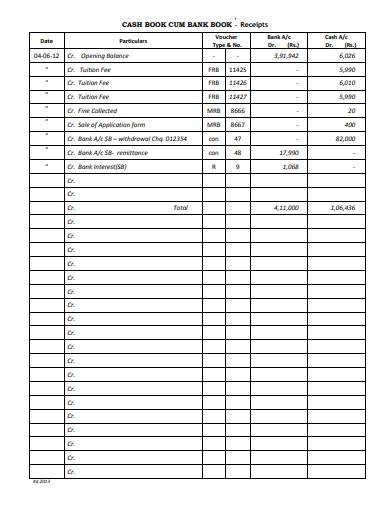Triple three column cash book explanation, format, example

To differentiate contra entries from other entries, letter “C” is printed in the posting reference column (on both the debit and credit sides of the cash book). Bank charges are recorded on the credit side of the cash book in the bank column. This is because cash at bank decreases as a result of such charges.
Single Column Cash Book FAQs
Both cash receipts and cash payments are recorded in a cash book. The cash book is also regularly reconciled with the bank statements as an internal auditing measure. The format of a double column cash book is similar to a single column cash book. The exception is that an additional column is included on both sides to record cash discount. For a Double Column or Two Column Cash Book, there are two columns to record amount on both sides. One column is to record transactions related to cash, and another column records transactions related to banks.
- Whenever a petty expense is recorded in the total payment column, the same amount is recorded in the relevant petty expense column.
- You can use one page a month, or if the entries are very few for each month, you can do two or three months on one page.
- Cash books are used to track the transactions between a business and its bank.
- After proper verification of expenditures, the head cashier pays an amount equal to the amount spent by the petty cashier again in advance to equalize the petty cashier’s prefixed fund.
Analytical Petty Cash Book
The cash flows will change with every transaction that is recorded in the petty cash book. The double-column cash book records both cash and bank transactions. The left shows income for cash and bank, and the right shows expenditures for both. Cash book accounting has two sides, i.e., the left-hand side and the right-hand side, where all the receipts in cash are recorded on the left side, whereas all the payments in cash are recorded on the right side.

Ask a Financial Professional Any Question
A petty cash book is maintained to record small expenses such as postage, stationery, and telegrams. It acts as a journal or book of prime entry because all cash transactions are recorded in it as and when they take place. A cash book is a subsidiary book in which both cash and bank transactions are maintained.
The difference between both of the cash books is that the columns of ‘Particulars’ and ‘Date’ are the same for the receipt and payment sides. In contrast to utilising a cash organizations book template, companies today prefer maintaining records with excel sheets or accounting software. An original entry in a cash book is a record of a financial transaction.
Do you own a business?
To make the two sides of the single column cash book equal, the difference is written on the credit side as “balance carried down” or simply “balance.” If a cheque is received and deposited into a bank account on the same date, it will appear on the debit side on the cash book in the bank column. The petty cash book may be considered to be a fourth type of cash book. Record the following transactions in a simple petty cash book for the month of January 2019. For a manufacturing company with stable earnings and a predictable return on equity, residual income valuation can provide a straightforward measure of economic profit.
Finance Strategists has an advertising relationship with some of the companies included on this website. We may earn a commission when you click on a link or make a purchase through the links on our site. All of our content is based on objective analysis, and the opinions are our own.
Use these cash book format instructions to make your very own cashbook spreadsheet using plain paper or a school exercise book. The following example summarizes the whole explanation of the triple-column cash book given above. Discount allowed is an expense, and discount received is an income of the business.
She holds a Masters Degree in Professional Accounting from the University of New South Wales. Her areas of expertise include accounting system and enterprise resource planning implementations, as well as accounting business process improvement and workflow design. Jami has collaborated with clients large and small in the technology, financial, and post-secondary fields. When an account holder deposits money with the bank, the bank’s liability to the account holder is increased from the bank’s point of view.
Under this system, the petty cashier is given a lump sum to meet petty expenses. When the whole amount of petty cash is spent, the petty cashier submits the account to the chief cashier who again pays a lump sum to the petty cashier. Utility companies typically have high capital requirements, meaning free cash flow may be low or inconsistent due to ongoing reinvestment needs.
It contains debits and credits which are double-entry Bookkeeping entries. Debits represent increases of value or asset accounts while credits represent decreases in value or liability accounts. The procedure of recording transactions in a triple/three-column cash book is similar to that of a double-column cash book.




